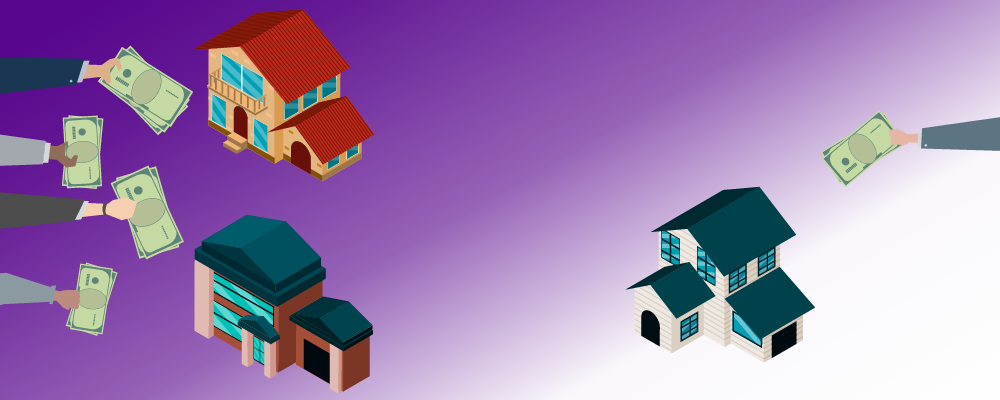News > Blog Article > 8 Advantages of Real Estate Crowdfunding …

As an investment choice, real estate provides one of the most lucrative options for those looking for long-term, stable investment returns. Unlike stocks or bonds, the real estate market isn’t as prone to wild minute-to-minute fluctuations, and real estate can offer more stable and better long-term returns. Many people may wonder why they should invest in real estate through Crowdfunding rather than traditional real estate investment vehicles.
There are obviously arguments for both but we are going to focus on 8 main reasons why Real Estate Crowdfunding is really a great alternative to traditional real estate investment:
Traditionally the real estate market has seemed like something of a closed book, inaccessible to non-professionals. This was down to high costs, admin issues, and geography-based constraints. With advancing technology and the development of the internet, remote real estate investing has opened up new opportunities for those looking to invest with lower amounts of capital.
The real estate investment market is now far easier to access because real estate crowdfunding platforms are very easy to use. Property investment was previously notorious for involving lengthy paperwork and maze-like legislation, but real estate crowdfunding platforms such as Bricksave now handle all of this for you, meaning that the investor only needs to worry about actually investing money and enjoying their returns.
Anyone with a computer can now invest in real estate and earn returns in the world's best currencies, that are likely to be higher than what they would get with a bank.
Before crowdfunding, investing in a property required large amounts of capital to cover the upfront costs. This is due to the fact that the financial burden was entirely on you, you're the only one investing, so you have to cover all the expenses.
The only other viable option was REITs (Real Estate Investment Trusts), but these were not ideal because the investor had little control over what properties were chosen for investment and little to no knowledge about the management of the properties. The collectivist backbone of Real Estate Crowdfunding has removed these high costs, and investors can now invest just a few thousand dollars into a property.
Currently estimated as a 2.6 billion dollar market worldwide, the real estate crowdfunding market has enabled non-accredited as well as non-professional investors to get involved without the need for large amounts of capital to get started. Investors can now invest relatively small amounts (from $2,500 with Bricksave) in properties located in any continent, any city. Real estate Crowdfunding is democratizing real estate investment.
Crowdfunding real estate platforms such as Bricksave allows you to invest in different properties around the world, which offers investors many exciting options and new opportunities for capital gains.
Thanks to this, it is possible to diversify your portfolio in the main currencies of the world and, therefore, to mitigate currency risks. This combined with lower costs provide a greater margin of more stable long-term returns.

Traditionally speaking, real estate has been a local business. If you were buying or investing, you had to be at least familiar with your target area, usually with physical access to it, otherwise you’d have had no idea what you were investing in.
This is no longer the case. Online investment platforms now allow you to browse and invest in properties in countries on the other side of the world, while also providing any information you might need on the local market and regulations. This global version of the real estate industry is only likely to gather more and more traction.
The EY Global Market Outlook 2016 identifies both innovation and transcontinental reach as two of the major trends currently affecting the real estate industry, especially considering the amount of money now available from emerging countries.
When it comes to administration and management, the system provided by online platforms allows the location of the property to no longer be an administrative headache.
Investors need to only consider the location in terms of maximum profitability, while the upkeep of the property and admin of the transactions are handled entirely by the online platform. The experience is now hassle-free and years of knowledge and expertise are no longer required.
Real estate investment is also a notoriously ‘admin-heavy’ business that involves large amounts of paperwork, middle-men, solicitors to deal with etc. Not to mention the issue of maintaining the property itself after investment, which again required large amounts of organisation and often input from a third party.
Since Real Estate Crowdfunding is done entirely online, investment in a property can be completed with just a few clicks, and property upkeep is handled by the platform itself, leaving investors to sit back, relax and monitor their investment remotely.
One thing that also used to characterise real estate investment, before Crowdfunding, was insider knowledge but the evolution of the internet is all about democratising information and the online real estate sector is no different. Information that was previously withheld from the public by professional property investors is now readily available, and in some cases even provided by the real estate crowdfunding platform itself.
One of Bricksave’s main directives, for example, is to provide all crowdfunders with any information they may need to make a decision about their investment. Everything from market trends to developer background can be sourced online, meaning that the investor is savvier than ever before.
Real Estate Crowdfunding platforms now do all the research for you and provide any relevant information online, meaning that investors aren’t left in the dark and know exactly what they’re putting their money into.
The overall goal here is to allow investors the chance to fully analyse the potential profitability for themselves (with help and advice from the platform) so they can make an informed decision.

The paperwork and organisation associated with putting money into real estate used to mean that a completed investment would take months to finalise. This timeframe has been reduced dramatically because of the fact that all Real Estate Crowdfunding transactions are done entirely online.
As mentioned above, bureaucracy and paperwork used to plague the real estate sector. With all-encompassing services being offered by platforms, even the transactional portion of a property deal can be done online, requiring minimal input from financial institutions. This means that real estate investment is fast becoming something you can do in an afternoon, as opposed to a process that’s drawn out over several months.
Like most industries, mobile technology has had an enormous impact on real estate. Along with new platforms that can be used on the go, the majority of property brokerages have mobile versions of their sites, and some are even developing their own specialised apps to compete with emerging start-ups.
Forbes magazine recently pointed out that platforms such as Zillow are fundamentally changing the way in which people buy property, allowing for easy access to market information and purchase options straight from the user’s mobile device.
What this will do to the industry is potentially make it markedly less formal; that is, instead of having to go to a real estate agent or fund manager to buy or invest in a property, you will be able to do it on your phone, regardless of where you are.
--
Sources:
1. http://www.ey.com/Publication/vwLUAssets/EY-global-market-outlook-2016-trends-in-real-estate-private-equity/$FILE/EY-global-market-outlook-2016-trends-in-real-estate-private-equity.pdf
2. http://www.worldwideerc.org/Resources/MOBILITYarticles/Pages/1212mcguire.aspx
3. https://www.forbes.com/sites/omribarzilay/2016/07/21/mobile-platforms-are-changing-the-way-we-buy-real-estate/#7e1f045b2ab0
rawpixel.com
Investing carries risks, including loss of capital and illiquidity. Please read our Risk Warning before investing.